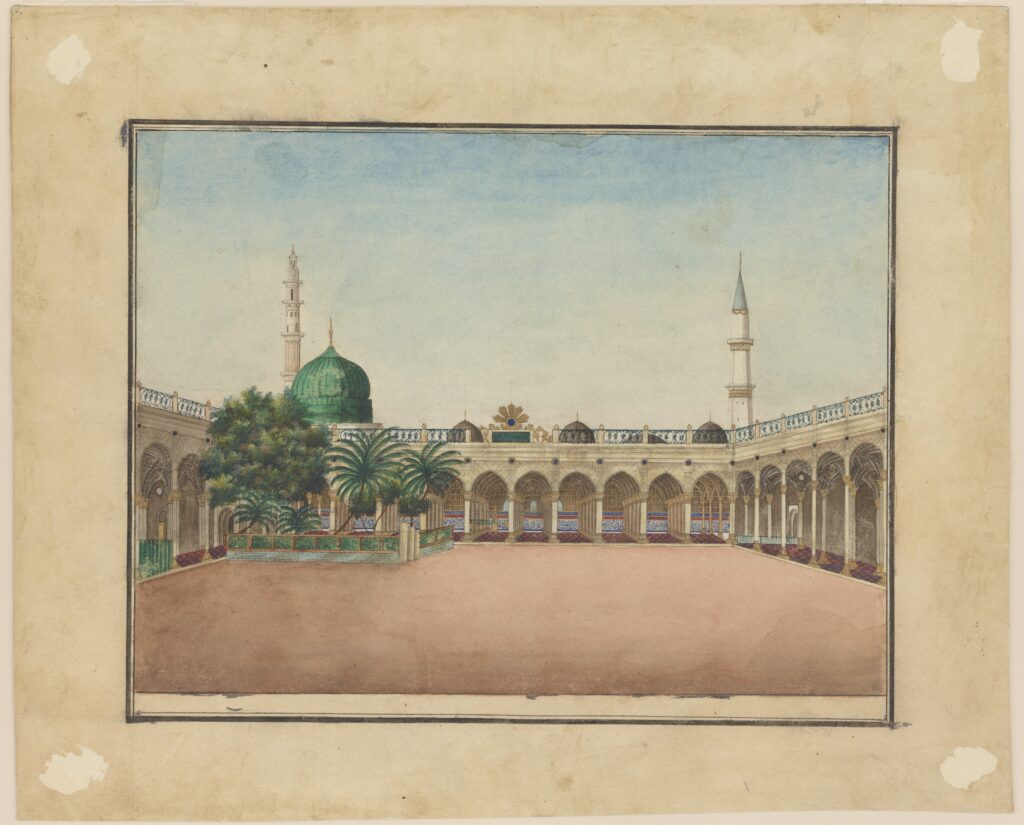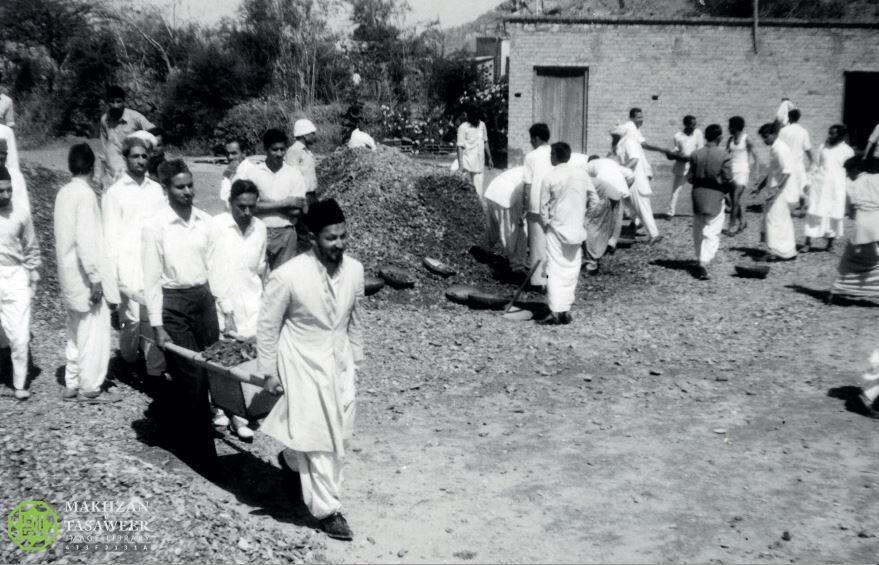Guidance regarding basic Islamic issues – which Hazrat Amirul Momineen, Khalifatul Masih Vaa has given on various occasions in his written correspondence and during MTA programmes – is being officially published below for everyone’s benefit
Zaheer Ahmad Khan, Head of Records Department, Private Secretariat, London

The Promised Messiahas, Khulafa, good & evil, Jamaat-e-Ahmadiyya and waqar-e-amal
Hazrat Amirul Momineen, Khalifatul Masih Vaa was asked various questions about Ahmadiyyat, the attire of the Promised Messiahas and Hazrat Khalifatul Masih and about some of the items used by them.
Huzooraa, in a letter dated 23 March 2020, gave the following reply to those questions:
“In the ahadith, it has been narrated by various companions that the Holy Prophetsa used to wear a turban [imamah]. Hence, Hazrat Jabirra bin Abdullah narrates that when the Holy Prophetsa entered Mecca on the day of the conquest of Mecca, he had a black turban on his blessed head.
“Similarly, Hazrat Amrra ibn Huraith narrates that Allah’s Messengersa addressed the people and he had a black turban on his blessed head. (Sahih Muslim, Kitab al-Hajj, bab jawazi dukhooli makkata bi-ghairi ihraa)
“The Promised Messiahas mentions this sunnah of the Holy Prophetsa and says:
“‘The Holy Prophetsa used to wear an izar [loose lower garment] and it is also proven that he acquired saraweel [trousers], which we call pajama or tambi [in the vernacular].’ (Al Hakam, No. 14, Vol. 7, 17 April 1903, p. 8)
“The Promised Messiahas was a true lover, perfect follower and a true servant of his master and guide, the Holy Prophet Muhammadsa, the Chosen One. Thus, he also wore a turban according to the sunnah of the Holy Prophetsa.
“As far as your suggestion for the Promised Messiahas to make a hair knot instead of wearing the turban is concerned, it should be remembered that Allah the Exalted conferred the status of a zilli and ummati prophet upon the Promised Messiahas owing to his most excellent level of obedience and an utmost degree of love for the Holy Prophetsa. Prophets are among the signs of Allah [sha‘airullah] and their respect and reverence is obligatory upon us. Therefore, such suggestions about the personality of a prophet are considered against his status.
“What has been said about a self-writing pen is wrong. Neither did the Promised Messiahas nor do I have any such pen. However, Allah the Exalted has such a relationship with His loved ones that He Himself guides them in every matter. That has been the relationship of Allah the Exalted with the Promised Messiahas as well as his Khulafa.
“As far as the Ahmadiyya Jamaat is concerned, it is not a new religion; rather, it is the true community of Islam which Allah the Exalted has established in exact accordance with the prophecies of the Founder of Islam, the Holy Prophet Muhammadsa, the Chosen One.
“Just as Allah the Exalted sent prophets in different regions and at different times for the reformation and betterment of the world and revealed teachings to them to guide the people in the past, He also sent our Master and Guide, the Holy Prophet Muhammadsa, the Chosen One, to guide the whole of mankind and revealed to him the eternal teaching of the Holy Quran which will last till the Day of Judgment.
“The Holy Prophetsa, upon being informed by Allah the Exalted, prophesied that a time would come when the Muslim ummah would be corrupted and the Muslims would turn away from the true teachings of Islam. At such a time, Allah the Exalted, having mercy on this ummah and in order to guide them, would raise an ardent devotee of the Holy Prophetsa from among his followers who would establish the people on the teachings which Allah the Exalted had revealed to the Holy Prophetsa and which he explained with his words and deeds.
“Hence, the Promised Messiahas spent his whole life fulfilling this responsibility. After his demise, the blessed system of Khilafat was established in Jamaat-e-Ahmadiyya in accordance with the prophecy of the Holy Prophetsa and, by the grace of Allah the Exalted, the Ahmadiyya Muslim Jamaat is resolutely spreading the peaceful message of Islam and its beautiful teachings all over the world under the blessed auspices of Khilafat.
“Therefore, the Ahmadiyya Jamaat is not a man-made institution, so that we should talk about its being simple or not; rather, it is a plant planted by Allah the Exalted and it is trying to spread the teachings given by God in the world for the good of mankind.
“The answer to your question about good and evil is as follows: What is the standard of good and evil? One thing may be bad for you but good for another. There are many examples of this in this world, but in the world of religion, the things that God has commanded to be performed are good and the things that God has forbidden are evil. In Islamic terminology, they are called al-awamir wa al-nawahi [commands and prohibitions]. A Muslim is expected to abide by these al-awamir wa al-nawahi, that is, to do what Allah and His Messengersa have commanded him to do, and to refrain from what Allah and His Messengersa forbade him to do. He will be dealt with according to such deeds.
“As far as the followers of other religions are concerned, Allah says that whoever has done any good deed from among them, Allah will never waste it. Hence, due to her giving water to a thirsty dog, Allah forgave a prostitute and admitted her to Paradise. This is because Allah the Exalted also possesses attributes based on mercy and has all the power to make use of them whenever He wishes.
“Those who have objected to your removal of garbage are wrong. In the Ahmadiyya Muslim Jamaat, the term ‘waqar-e-amal’ is used for such work. That is, a deed that increases one’s dignity and honour. Keeping one’s surroundings and environment clean is a very good habit that has been commanded by Allah the Exalted and His Messengersa. I myself have picked up litter many times under the scheme of waqar-e-amal and have cleaned dirty drains.
“Cleaning up and picking up garbage is not dishonouring at all. Honour is in the hands of Allah the Exalted and one loses honour by disobeying His commandments. Therefore, we should always try to follow the commandments of Allah the Exalted.”

Instalments and interest
Someone wrote to Hazrat Amirul Momineen, Khalifatul Masih Vaa and asked if it was considered interest, while selling goods of everyday use, to charge those who pay for those goods in instalments a little more than the normal price.
In a letter dated 30 March 2020, Huzooraa gave the following reply to this question:
“In your business dealings, if you tell the buyers beforehand that a certain item would cost that much if paid for in cash and if they paid for the same item in instalments then they would have to pay that much more then there is no issue with that. It does not fall into the category of interest. This is because in the latter case, you would have to keep a regular account of those who buy things in instalments and may even have to send them reminders to pay up their instalments, which will inevitably cost you time. In worldly dealings, time has a certain price. That is why it is for their time that employers receive large salaries.”
An intoxicated husband

Someone wrote to Hazrat Amirul Momineen, Khalifatul Masih Vaa about an incident reported in a newspaper of a woman who had refused to lie with her husband because he was heavily drunk. She then asked if feelings of love could be sustained if one of the spouses was intoxicated.
In a letter dated 30 March 2020, Huzooraa gave the following reply to this question:
“In such a case, the question is not whether the feelings of love will remain or not; rather, it is a matter of sound nature [saleem fitrat]. Hence, in the Holy Quran, Allah the Exalted has guided us by preserving this prayer of Pharaoh’s wife for us, which states:
رَبِّ ابْنِ لِي عِنْدَكَ بَيْتًا فِي الْجَنَّةِ وَنَجِّنِي مِنْ فِرْعَوْنَ وَعَمَلِهِ
“‘My Lord! build for me a house with Thee in the Garden; and deliver me from Pharaoh and his work.’ [Surah al-Tahrim, Ch.66: V.12]
“It is clear from this verse that Pharaoh’s wife was definitely compelled to separate from Pharaoh, so she beseeched God.
“Therefore, this Quranic teaching proves that if the corrupt husband of a believing woman does not reform despite the admonition and there is nothing else preventing her from separating from him, then she should separate from such an evil husband after praying.”
Social distancing during congregational prayers
Someone requested Hazrat Amirul Momineen, Khalifatul Masih Vaa for guidance regarding the social distancing of 1.5 metres between worshippers during congregational prayers owing to the exceptional circumstances that had arisen due to the coronavirus pandemic.
Huzooraa, in a letter dated 28 April 2020, gave the following guidance on this issue:
“According to the prophetic instruction of إِنَّمَا الْأَعْمَالُ بِالنِّيَّاتِ, every commandment of Islam is dependent on intentions. For congregational prayers, the worshippers have been instructed to stand shoulder to shoulder, knee to knee and ankle to ankle and not to leave any gap between them. One point of wisdom behind this has been stated that if you create a physical distance between yourselves, then Satan will find space between you and create discord in your hearts.
“Now that we are compelled and governments are taking such steps for the welfare of their citizens, when we observe social distancing during prayer according to government rules, it is not our intention that discord may be created between us or that Satan may cause division between us; rather, it is our intention that we should remain united, fight this disease together and cooperate with the authorities regarding these governmental measures for the welfare of the people. Hence, there is no harm in keeping distance between the worshippers during congregational prayers with this intention and in this case of emergency.
“One can draw authority for this from [the permission to] pray on a mount during a journey when compelled because in that case too, the condition of standing shoulder to shoulder, knee to knee and ankle to ankle is not met and sometimes there is a gap between the worshippers. Therefore, just as it is proven from the sunnah of the Holy Prophetsa to do so due to being compelled during a journey, there is no harm in keeping a distance between the worshippers due to this disease under the current compelling circumstances.
“May Allah have mercy and remove these difficult circumstances from the whole world soon so that His worshipping servants may then be able to offer their offerings of worship to their Lord while meeting all the conditions in the best possible manner. Amin.”

